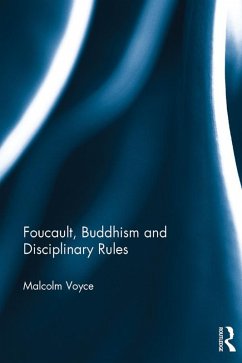This book suggests that previous critiques of the rules of Buddhist monks (Vinaya) may now be reconsidered to deal with some of the assumptions concerning the legal nature of these rules and to provide a focus on how Vinaya texts may have actually operated in practice. Malcolm Voyce utilizes the work of Foucault and his notions of 'power' and 'subjectivity' in three ways. First, to examine the Buddha's role as a law maker to show how Buddhist texts were a form of law making that had a diffused and lateral conception of authority. While law makers in some religious groups may be seen as authoritative, in the sense that leaders or founders were coercive or charismatic, the Buddhist concept of authority allows for a degree of freedom for the individual to shape or form themselves. Second, to show that the confession ritual, acted as a disciplinary measure to develop a unique sense of collective governance, based on self regulation, self-governance and self-discipline. Third, to argue that while the Vinaya has been seen by some as a code or form of regulation that required obedience, the Vinaya had a double nature in that its rules could be transgressed and that offenders could be dealt with appropriately in particular situations. Voyce shows that the Vinaya was not an independent legal system, but that it was dependent on the Dharmas stra for some of its jurisprudential needs, that it was not in the strict sense a form of customary law, but a wider system of jurisprudence linked to Dharmas stra principles and precepts.
Dieser Download kann aus rechtlichen Gründen nur mit Rechnungsadresse in A, B, BG, CY, CZ, D, DK, EW, E, FIN, F, GR, HR, H, IRL, I, LT, L, LR, M, NL, PL, P, R, S, SLO, SK ausgeliefert werden.


